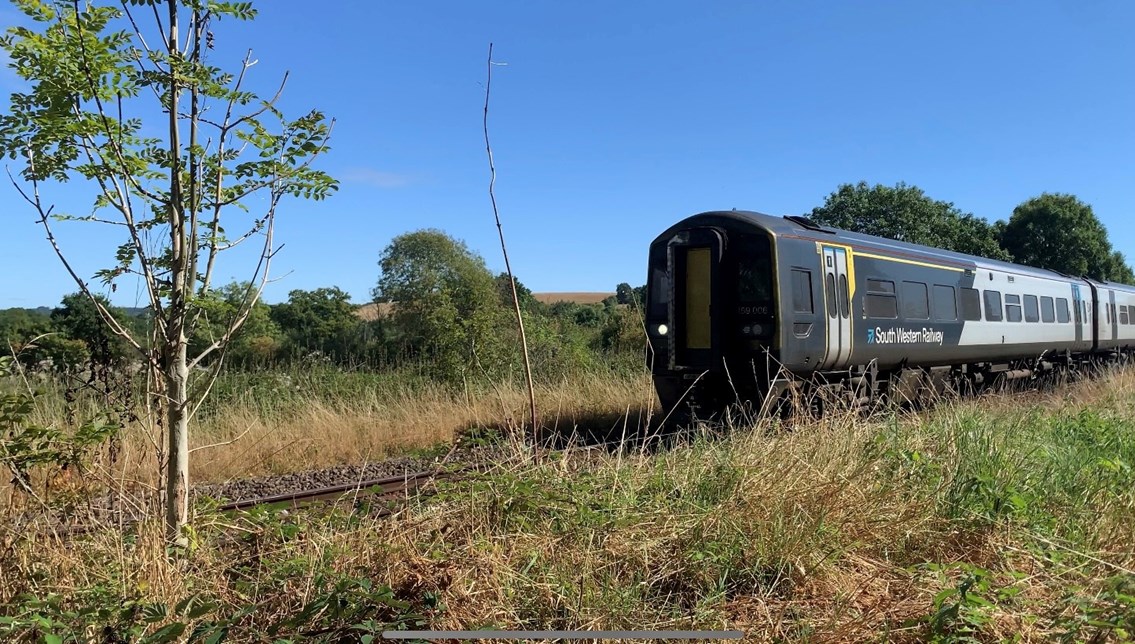Tuesday 30 Aug 2022
Long, hot summer means major changes to trains on the West of England line in Dorset and Wiltshire as dried-out soil takes its toll on tracks
- Region & Route:
- Southern
- | Southern: Wessex
Major changes to train services on the West of England main line west of Salisbury have had to be made after a 4-mile long speed restriction was put in place between Gillingham and Tisbury, in Dorset and Wiltshire.
The South of England has endured its driest July since 1936, as well as the hottest temperatures ever recorded, and the impact has now been felt on the railway.
Sections of railway built on clay-based soil, including those around Gillingham, have dried out so badly that they have shrunk, leaving the track on top uneven and dangerous to run trains at full speed.
It is likely that the speed restriction will remain in place until October, as engineers must wait for the soil to regain some of its moisture before a repair can be carried out.
Network Rail’s Head of Track Engineering for Southern Region, Colum Cavanagh, said: “We call this problem Soil Moisture Deficit and although we encounter issues with it most summers, this year has been absolutely unprecedented.
“We came into the hot season with our track in the best condition it’s ever been in, and yet now – late August – the soils around Gillingham have dried so badly the track is only able to take trains running at 40mph, down from 80mph.
“Normally we would take a piece of kit called a tamper in and sort the track out, a bit like shaking a duvet and getting it flat again. This year the problem is so bad that the soil is still shrinking and it’s going to be some weeks until it has stabilised enough for us to do the work to bring line speeds back up to normal.
“We’re very grateful for everyone’s patience as we know the changes to trains must be frustrating, but the changes are there to keep everyone safe.”
Train services have had to be amended as the line is single – so no trains can pass each other – and trains are taking double the normal length of time to run between Gillingham and Tisbury.
The full revised timetable is currently being finalised and will be published later this week.
Claire Mann, SWR’s Managing Director said: “After two weeks of delays and short-notice changes to our services, this decision to introduce a revised timetable will allow us to run a resilient service and at least provide certainty to our customers in the West of England. I am sorry to all those whose journeys will be affected as we wait for weather conditions to improve so Network Rail can safely remove the speed restriction.”
Mr Cavanagh added: “Based upon a recent reconstruction of a clay embankment at Edenbridge in Kent, if we were to rebuild all 6,000 of our clay embankments with modern materials, it could cost anywhere between £15bn to £20bn and take decades to complete.
“We need to manage with what we’ve got and should summers like this one become the norm, we will need to change the way we work to reflect that. Unfortunately, the people who built the railway to Gillingham in 1859 didn’t realise the impact they would have on us 160 years later building their railways on clay soil.”
Contact information
Passengers / community members
Network Rail national helpline
03457 11 41 41
Latest travel advice
Please visit National Rail Enquiries
Journalists
Dan Fane
Communications manager
Network Rail
dan.fane@networkrail.co.uk
About Network Rail
We own, operate and develop Britain's railway infrastructure; that's 20,000 miles of track, 30,000 bridges, tunnels and viaducts and the thousands of signals, level crossings and stations. We run 20 of the UK's largest stations while all the others, over 2,500, are run by the country's train operating companies.
Usually, there are almost five million journeys made in the UK and over 600 freight trains run on the network. People depend on Britain's railway for their daily commute, to visit friends and loved ones and to get them home safe every day. Our role is to deliver a safe and reliable railway, so we carefully manage and deliver thousands of projects every year that form part of the multi-billion pound Railway Upgrade Plan, to grow and expand the nation's railway network to respond to the tremendous growth and demand the railway has experienced - a doubling of passenger journeys over the past 20 years.
Follow us on Twitter: @networkrail
Visit our online newsroom: www.networkrailmediacentre.co.uk

